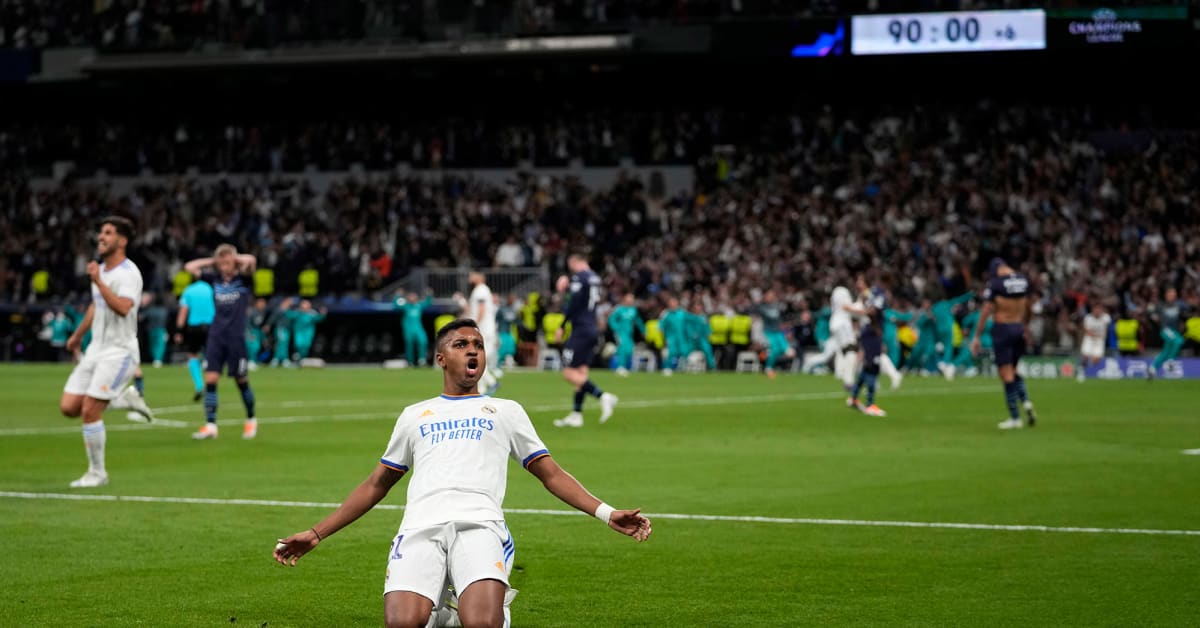No Champions League Chaos Is Beyond Real Madrid
With every passing round in this season’s Champions League, the competition it has managed to make its own, Real Madrid’s comebacks have become more spectacular. It looked finished against Paris Saint-Germain and then scored three times in the final half hour of the last 16. It threw away a two-goal lead against Chelsea, then came back to force extra time and find a winner in the quarterfinals. But in neither of those ties did Madrid seem quite so beaten as it did against Manchester City in the second leg of the semifinals on Wednesday.
It was two goals behind on aggregate with 90 minutes on the clock, and yet even the amount of chaos it would have taken to overcome that was not beyond Real Madrid. It is the Spanish champion, and not Man City, that will face Liverpool in the Champions League final in Paris at the end of the month after the unlikeliest of 6–5 aggregate triumphs. It sets up a repeat of the 1981 final, even down to the city (although in a different stadium) when Liverpool won, and a repeat of the final in Kyiv four years ago when Madrid won. It’s a clash of the 13-time winners and the six-time winners, and it will mark the first time two sides will have met in three different finals.
City had played sensibly, stifling Madrid to the point it didn’t have a shot on target in the first 90 minutes (in which time it had nine). Riyad Mahrez had put City ahead on the night after 73 minutes, giving it a 5–3 aggregate lead. Jack Grealish then had an effort cleared off the line by Ferland Mendy. It seemed over. City had, after all, missed chance after chance after chance in the first leg; this seemed like the natural outcome. Fans were beginning to leave. Then Karim Benzema, who had been quiet to that point, knocked a ball back across goal for Rodrygo to fire in the lifeline. Within a minute, the Brazilian had made it 5–5, heading in a deflected right-wing cross from Dani Carvajal.
That took the game to extra time, and within four minutes, Benzema had put Madrid ahead from the penalty spot after being brought down by Rúben Dias—his 10th goal in the knockout stage this season making it 3–1 on the night, 6–5 on aggregate. That was three goals conceded in 10 minutes of playing time for City, marking a reminder of an old failing of Guardiola sides—the habit of conceding goals in batches, two or three in a period of 10-15 minutes, as though the mechanisms are too sophisticated, too delicate, easily to be reset when something goes awry. And perhaps because Guardiola sides are so focused on the team, on the interlocking parts, his sides cannot accommodate the sort of individual who could drag a game back when it begins to go against them.
It made no sense. City had been the better side for almost all three hours of the tie before Rodrygo’s double. But Madrid has an inexplicable capacity to keep finding brilliance just when it needs it. And Guardiola sides have an equal capacity for suffering outrageous misfortune, for failing to take their chances and finding their opponents have become utterly ruthless. After Barcelona against Inter Milan in 2010 and against Chelsea in ’12, after Bayern Munich against Atlético Madrid in ’16, after City against Tottenham in ’19, this was another tie lost in barely credible circumstances.
This is a tournament that has come to torment Guardiola, something that may predate his time as a manager. He was a ball boy in 1986 when Barcelona, the team he supported, came from 3–0 down to beat IFK Gothenburg in the semifinal, only to blow it unthinkably against Steaua Bucuresti in the final. That seemed to confirm that it was a tournament for Madrid, not for Barcelona. It confirmed the neuroses that are still being played out now.
Guardiola did win the Champions League in 1992, but he was then in the side hammered 4–0 in the final by AC Milan two years later. And although he has won the tournament twice as a manager, the setbacks have mounted up over the past 11 years, most of which he has spent in charge of some of the greatest sides in the world. City, despite all its investment, like Paris Saint-Germain, has still not won the prize it wants most of all.
Carlo Ancelotti has known heartache in the tournament, most notably against Liverpool in 2005, but his phlegmatic character seems perfectly suited to it. He will be the first manager to coach in five different finals, and could be the first to win the competition four times. Madrid has, throughout this competition, ridden its luck, survived through periods in which it has been outplayed and somehow found a way to win. The tifo at the Bernabéu before the match read, “Another magical night for the kings of Europe.” This couldn’t have been imagined, though.
It seems implausible to think it could do the same again, but with this Madrid—and Guardiola teams—the usual rules don’t seem to apply.
More Soccer Coverage From Jonathan Wilson:







